五年级上册快乐英语翻译第8课
外研版三起点五年级上册课文英译汉
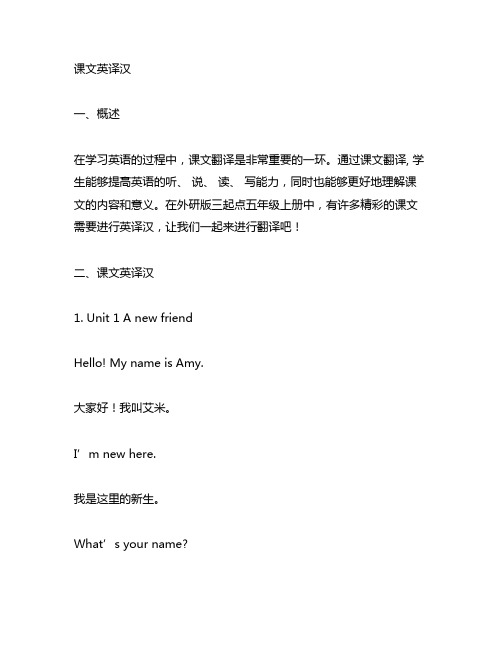
课文英译汉一、概述在学习英语的过程中,课文翻译是非常重要的一环。
通过课文翻译, 学生能够提高英语的听、说、读、写能力,同时也能够更好地理解课文的内容和意义。
在外研版三起点五年级上册中,有许多精彩的课文需要进行英译汉,让我们一起来进行翻译吧!二、课文英译汉1. Unit 1 A new friendHello! My name is Amy.大家好!我叫艾米。
I’m new here.我是这里的新生。
What’s your name?你叫什么名字?My name is Kate.我叫凯特。
Nice to meet you, Kate.很高兴认识你,凯特。
Nice to meet you, too, Amy. 我也很高兴认识你,艾米。
2. Unit 2 My classroom This is my classroom.这是我的教室。
It’s big and clean.它又大又干净。
We have light music before class.我们在课前放轻音乐。
What can we see on the wall?我们在墙上能看到什么?We can see some pictures and maps. 我们能看到一些图片和地图。
3. Unit 3 Where is my ruler?Where is my ruler, Amy?我的尺子在哪里,艾米?It’s on the desk.它在桌子上。
No, it isn’t.不,它不在。
It’s in your pencil case.它在你的铅笔盒里。
Oh, yes. Thank you, Kate.哦,是的。
谢谢你,凯特。
You’re wee.不客气。
4. Unit 4 What’s in your schoolbag? What’s in your schoolbag, Kate?你的书包里有什么东西,凯特?A ruler, two pencils and a picture.一把尺子,两支铅笔和一张图片。
译林版(三起)英语五年级上册Unit 8 At Christmas Cartoon time课件

Guess and say
Why do they like Christmas? 他们为什么喜欢圣诞节?
?
?
Guess and say
I always have a big dinner on Christmas Day.
Let’s summarizeΒιβλιοθήκη FirstNext
两分钟准备
______, Sam and Bobby____a Christmas tree
Tips and ______ Christmas _____.
___________,___t_h_,e,yStahsmeeeya_ntad_l_k_.
四人小__组___讨___论, th,e_yB_aot_尝abbl_okb_u试aytb_ob_u_概tu__y____括_________,____________._.____.
What's the matter with him?
confused
困惑的
Let’s read(分组读)
Sam and Bobby see Mr Turkey.
Mr Turkey looks sad.
What's wrong with him?
Let’s ask him.
Let’s ask
What's wrong with you ?
What do they do before the party? 聚会前,他们要做什么准备?
Discuss and order
一分钟准备
First
Next
Invitation
译林版(三起)五年级英语上册Unit8 At Christmas课文翻译

译林版(三起)五年级英语上册Unit8 At Christmas课文翻译Pages 78-79 Story timeWe always have a lot of fun at Christmas.在圣诞节我们总是很愉快。
①First,we buy presents for our family and friends.首先,我们买礼物给我们的家人和朋友。
We also buy a Christmas tree.我们也买一棵圣诞树。
We sometimes go to see Father Christmas.我们有时去看圣诞老人。
②Next,we put some pretty things on the Christmas tree.接着,我们放一些漂亮的东西在圣诞树上。
We also put our presents under the tree. It looks great!我们也把我们的礼物放在圣诞树下。
它看起来太好了!③Then,Christmas Eve comes.然后,圣诞夜来了。
We put a stocking on our bed and wait for presents.我们放一个长筒袜在我们的床上并且等待礼物。
④Finally,it is Christmas Day!最后,圣诞节这一天!We wake up early and open our presents.我们起来的很早,打开我们的礼物。
We have a big lunch.我们有一个丰盛的午餐。
We eat a Turkey and Christmas pudding. 我们吃一只火鸡和圣诞布丁。
We all have a good time!我们全都很开心!单词a card 一张卡片a Christmas tree 一棵圣诞树father Christmas圣诞老人a present 一个礼物a stocking 一个长筒袜a turkey 一只火鸡Page83 sound timeJjacket 夹克衫juice 果汁jump 跳subject学科Don't jump up,little dog!不要往上跳,小狗!You'll get juice on my jacket.你会把果汁弄到我的夹克衫上。
五年级上册英语第八课单词音标
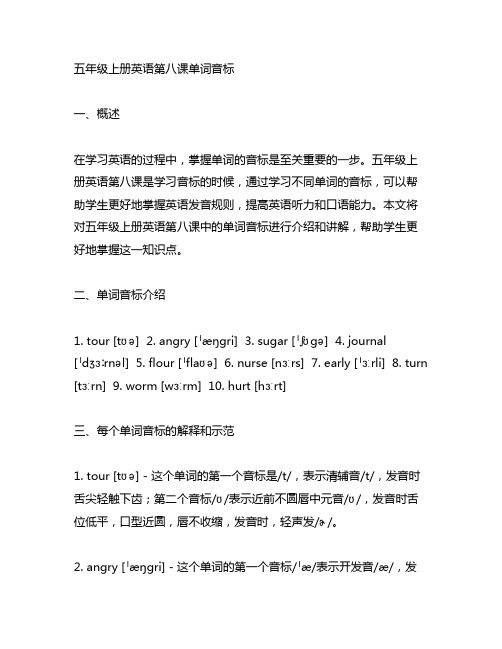
五年级上册英语第八课单词音标一、概述在学习英语的过程中,掌握单词的音标是至关重要的一步。
五年级上册英语第八课是学习音标的时候,通过学习不同单词的音标,可以帮助学生更好地掌握英语发音规则,提高英语听力和口语能力。
本文将对五年级上册英语第八课中的单词音标进行介绍和讲解,帮助学生更好地掌握这一知识点。
二、单词音标介绍1. tour [tʊə]2. angry [ˈæŋɡri]3. sugar [ˈʃʊɡə]4. journal[ˈdʒɜːrnəl] 5. flour [ˈflaʊə] 6. nurse [nɜːrs] 7. early [ˈɜːrli] 8. turn [tɜːrn] 9. worm [wɜːrm] 10. hurt [hɜːrt]三、每个单词音标的解释和示范1. tour [tʊə] - 这个单词的第一个音标是/t/,表示清辅音/t/,发音时舌尖轻触下齿;第二个音标/ʊ/表示近前不圆唇中元音/ʊ/,发音时舌位低平,口型近圆,唇不收缩,发音时,轻声发/ɚ/。
2. angry [ˈæŋɡri] - 这个单词的第一个音标/ˈæ/表示开发音/æ/,发音时改变口型为半开;第二个音标/ŋ/表示鼻辅音/ng/,发音时舌尖轻触上颚,气流穿过鼻腔;第三个音标/ɡ/表示擦通辅音/ɡ/,发音时放松舌头,震动声带。
3. sugar [ˈʃʊɡə] - 这个单词的第一个音标/ˈʃ/表示清擦音/ʃ/,发音时舌尖轻触下齿,气流通过舌尖与下颚间的缝隙;第二个音标/ʊ/表示近前不圆唇中元音/ʊ/,发音时舌位低平,口型近圆,唇不收缩;第三个音标/ɡ/表示擦通辅音/ɡ/,发音时放松舌头,震动声带。
4. journal [ˈdʒɜːrnəl] - 这个单词的第一个音标/ˈdʒ/表示清擦塞音/dʒ/,发音时舌尖轻触下齿,气流通过舌尖与上颚间的缝隙;第二个音标/ɜː/表示开元音/ɜː/,发音时舌位低平,口型中等大小,唇不收缩;第三个音标/ɴ/表示鼻辅音/ɴ/,发音时将舌头抵住上颚,气流通过鼻腔。
英语五年级上册第八课
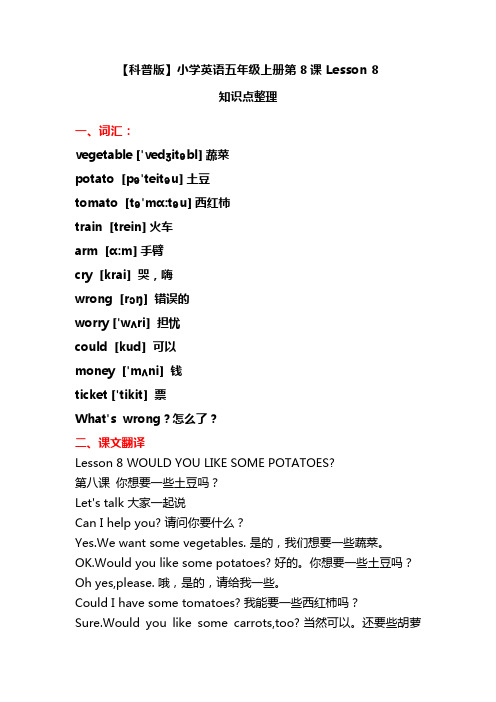
【科普版】小学英语五年级上册第8课 Lesson 8知识点整理一、词汇:vegetable ['vedʒitəbl] 蔬菜potato [pə'teitəu] 土豆tomato [tə'mɑ:təu] 西红柿train [trein] 火车arm [ɑ:m] 手臂cry [krai] 哭,嗨wrong [rɔŋ] 错误的worry ['wʌri] 担忧could [kud] 可以money ['mʌni] 钱ticket ['tikit] 票What's wrong?怎么了?二、课文翻译Lesson 8 WOULD YOU LIKE SOME POTATOES?第八课你想要一些土豆吗?Let's talk 大家一起说Can I help you? 请问你要什么?Yes.We want some vegetables. 是的,我们想要一些蔬菜。
OK.Would you like some potatoes? 好的。
你想要一些土豆吗?Oh yes,please. 哦,是的,请给我一些。
Could I have some tomatoes? 我能要一些西红柿吗?Sure.Would you like some carrots,too? 当然可以。
还要些胡萝卜吗?Yes,some carrots,too. 是的,还要一些胡萝卜。
Here you are. 给你。
Thank you. 谢谢。
Let's learn 大家一起学习Would you like some tomatoes? 你想要一些西红柿吗?Oh,yes.Could I have some cabbages,too? 哦,是的,我还可以要一些卷心菜吗?Sure.当然可以。
tomatoes,cabbages 西红柿,卷心菜potatoes,carrots 土豆,胡萝卜Chinese cabbages,peas 大白菜,豌豆Let's sing 大家一起来唱歌Jingle bells 铃儿响叮当Dashing through the snow,in a one-horse open sleigh.O'er the fields we go,laughing all the way.Bells on bobtail ring.Making spirits bright.What fun it is to ride and sing a sleighing song tonight. Jingle bells,jingle bells,jingle all the way!Oh!What fun it is to ride in a one-horse open sleigh!Jingle bells,jingle bells,jingle all the way!Oh! What fun it is to ride in a one-horse open sleigh!(歌曲)Listen and number 听录音,标序号。
五年级上册英语翼教版第八课课堂笔记
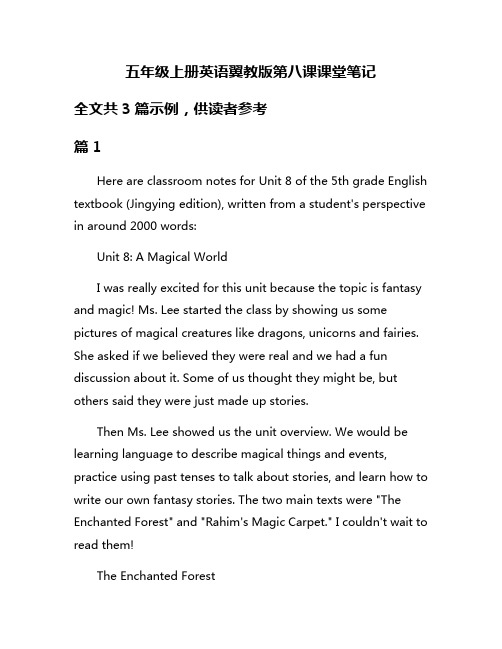
五年级上册英语翼教版第八课课堂笔记全文共3篇示例,供读者参考篇1Here are classroom notes for Unit 8 of the 5th grade English textbook (Jingying edition), written from a student's perspective in around 2000 words:Unit 8: A Magical WorldI was really excited for this unit because the topic is fantasy and magic! Ms. Lee started the class by showing us some pictures of magical creatures like dragons, unicorns and fairies. She asked if we believed they were real and we had a fun discussion about it. Some of us thought they might be, but others said they were just made up stories.Then Ms. Lee showed us the unit overview. We would be learning language to describe magical things and events, practice using past tenses to talk about stories, and learn how to write our own fantasy stories. The two main texts were "The Enchanted Forest" and "Rahim's Magic Carpet." I couldn't wait to read them!The Enchanted ForestThis was such an imaginative story about a girl named Lily who discovers a magical forest near her house. As we read each part, Ms. Lee had us stop and discuss what we thought might happen next. We practiced using phrases like "might be able to", "could possibly", and "it seems like" to make predictions.My favorite part was when Lily met the talking tree! I would be so amazed if a tree started speaking to me. We learned how to use quotations to show direct speech. For example: The tree said, "Welcome to the Enchanted Forest, Lily."After reading, we did an activity where we had to recount the major events in the correct sequence using past tense verbs like "went", "saw", "met", etc. It really helped cement the storyline in my mind.Rahim's Magic CarpetThis story was about a young boy who finds an old carpet that can actually fly! Ms. Lee pointed out descriptive language the author used, like "tattered and worn" and "the carpet rose slowly into the air." We had to find other examples of vivid descriptions.The best part was when Rahim flew over the city and could see all the buildings and cars looking tiny below. We discussedwhat we would do if we had a magic carpet. I said I would fly over to a tropical island for vacation!For grammar, we learned about using different past tenses together, like simple past "Rahim found the carpet" and past continuous "he was exploring in the attic." We did substitution drills switching between the tenses. It was challenging but good practice.Writing a Fantasy StoryFor the unit writing task, we had to develop our own original fantasy story featuring magical elements. Ms. Lee gave us a structure to follow:Introduction of main character and settingThe magical encounter or discovering magicEvents and obstacles because of the magicResolution and endingI decided my story would be about a girl who finds a spell book and accidentally turns her little brother into a frog! Then she has to go on a quest to find ingredients to reverse the spell. Along the way, there would be challenging run-ins with other magical beings and places.Ms. Lee had us spend a few classes just doing prewriting - brainstorming ideas, creating character profiles, and outlining the plot sequence. Then we worked on drafting and revising our stories, focusing on descriptive language and consistent verb tenses.I really enjoyed exercising my creativity for this assignment! Sharing our stories was the highlight at the end of the unit. I was amazed by the imaginative worlds my classmates came up with using the techniques we learned.Overall, Unit 8 was a delightful journey into fantasy and magic. I feel more confident now in my ability to narrate sequences of events, make predictions, and craft engaging stories. On to the next unit's adventure!篇2Here are classroom notes for Unit 8 of the 5th grade English textbook (Jingying Edition), written from a student's perspective in English (around 2000 words):Unit 8: A Taste of Chinese CultureClass notes by [Your Name]Today in English class, we started a new unit all about Chinese culture! I'm really excited because I love learning about the rich traditions and history of our country. Mrs. Wang said we'd be exploring different aspects of Chinese culture through readings, videos, activities and even some cooking. Yum!Reading: The Dragon Boat FestivalWe began by reading a passage about the Dragon Boat Festival, which is celebrated annually on the 5th day of the 5th month on the Chinese lunar calendar. Some key points:It commemorates the life and death of the famous poet Qu Yuan who lived around 300 BCPeople race dragon boats, which are long boats brightly painted with a dragon head at the frontFamilies prepare and eat zongzi - sticky rice dumplings wrapped in bamboo leavesThey also hang up plants like calamus, goldthread and moxa to repel insects and evildoersI didn't know the Dragon Boat Festival had such ancient origins! The racing and symbolism with the dragon boats sounds really exciting. I can't wait to try making zongzi.Vocabulary:We learned some great new vocabulary words from the reading:commemorate, calamus, goldthread, moxa, repel, evildoerMrs. Wang had us practice using them in sentences. For example:The town commemorates its founding with a big festival every year.I will hang up moxa plants to help repel mosquitoes this summer.Video: The Traditions of the Dragon Boat FestivalNext we watched a short video showing how the Dragon Boat Festival is celebrated around China today. I saw:The colorful dragon boat racing competitionsFamilies preparing zongzi togetherPeople drinking realgar wine, eating rice pudding and other festive foodsHanging up symbolic decorations like moxa and calamus plantsThe racing looked so fun and competitive! I loved seeing the rowers paddle in sync to the rhythmic drumbeats. Making the zongzi dumplings also seemed like a nice family tradition to spend time together. I can't wait to celebrate this holiday.Speaking Activity: Explaining a FestivalFor the speaking portion, Mrs. Wang put us in small groups and had each person explain a different Chinese festival to their group members. I was assigned the Mid-Autumn Festival.I explained:When it takes place (the 15th day of the 8th lunar month, usually September)Popular traditions like eating mooncakes, carryingbrightly-lit lanterns, and enjoying the full moonThe festival's origins from ancient myths and moon worshipMy groupmates asked lots of good follow-up questions about things like what goes inside mooncakes. Speaking practice really helps improve my English skills.Reading Comic StripsAs a fun way to work on reading comprehension, we read through some short comic strips related to Chinese culture. Onewas about a kid trying to put on a Beijing Opera mask and make-up. Another showed a family making dumplings together for the New Year.The comic strips had very descriptive language and idioms that made them challenging but interesting to decipher. I like how they combined visuals with the English text to help convey the cultural concepts.Overview of Homework:For homework this week, we have a few assignments related to this unit:Write a short essay describing your favorite Chinese festival and traditionsResearch and create a fact sheet about one aspect of Chinese culture (food, clothing, arts, etc.)Prepare a show-and-tell item or demonstration related to our unit for next classI'm going to make a fact sheet all about the fascinating history and styles of Beijing Opera, complete with pictures and key vocabulary words. For show-and-tell, maybe I'll demonstrate how to fold a simple dumplings or origami figure.I really enjoyed our first dive into this engaging new unit! Learning about the diversity of Chinese cultural traditions is not only interesting, but helps me appreciate the richness of our heritage. I'm looking forward to soaking up more knowledge and having some hands-on experiences in the coming weeks. Studying English while exploring my own culture is a fun way to make the lessons meaningful.篇3Here are classroom notes for Unit 8 of the 5th grade English textbook (Jingying Edition), written from the perspective of a student in around 2000 words:Unit 8: On the Way to SchoolClass Notes:Today in English class, we started a new unit all about going to school. Ms. Lee introduced some new vocabulary words related to transportation and school routines.First up were words for different vehicles:Bike - A two-wheeled vehicle that you pedalBus - A big vehicle that carries lots of passengersCar - A four-wheeled vehicle that a family usesTrain - A vehicle on railways with multiple connected carriagesPlane - A vehicle that flies through the airWe practiced saying and spelling these new words. Some are easy like "car" but others like "vehicle" have tricky letter combinations.Next, we learned phrases describing how we get to school:Take the busRide a bikeWalk to schoolGet a ride (when parents drive you)Catch the trainI take the bus to school every morning. It's kind of a long ride, around 30 minutes. My best friend Erik rides his bike most days since he lives pretty close. We talked about our different routines.After transportation vocabulary, we moved on to words about school schedules and routines:Get up early - To wake up before most people, like 6 or 7 AMGet ready - Activities like brushing teeth, getting dressed, etc.Rush out the door - To leave home very quickly without much timeBe on time - To arrive at the correct scheduled time, not lateMorning routine - The things you do every morning before leavingMy morning routine is pretty standard. I get up at 6:30 AM, brush my teeth, get dressed, eat breakfast, and then rush to catch the bus by 7:20. Getting ready on time is always a challenge! I'm often running late.For practice, Ms. Lee had us write out our entire morning routines from waking up to arriving at school. We used the new vocabulary words as much as possible. Here's what I wrote:"I get up at 6:30 every morning. First, I brush my teeth and get dressed. Then I go downstairs and eat breakfast quickly. At 7:15, I rush out the door to wait for the bus. I can't be late! The bus arrives at 7:20 and I take the bus to school. I usually get to class right before the bell rings at 8 AM."After writing, we paired up to discuss each other's routines. Erik and I compared how we get ready and get to schooldifferently. Even though we're friends, our morning routines are quite different!To wrap up the class, Ms. Lee taught us a new song called "On the Way to School." It repeats lots of the transportation phrases we learned. The chorus goes:"On the way to school, on the way to school,Taking the bus or riding my bike,Walking along or catching a ride,Off to school, Off to school!"We all sang along and did hand motions for the different vehicles. It's a really catchy, fun song to help remember the new vocabulary.For homework, we have to write about our dream way to get to school. How would we want to travel if we could? Maybe by helicopter, jetpack, or even teleportation? I'm excited to use my imagination and writing skills for this assignment.Overall, it was an engaging first lesson for Unit 8. I feel like I learned a lot of useful words and phrases about transportation and morning routines. Singing the song together was a high point. Can't wait for the next class!。
五年级上册英语-Lesson 8 Would you like some potatoes? 科普版PPT课件
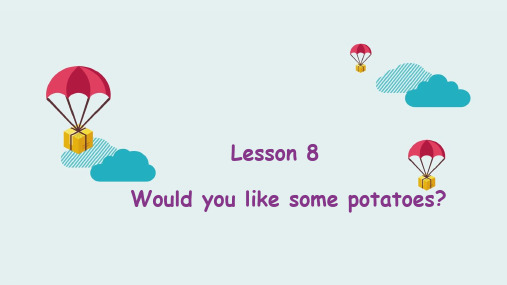
shop buy drink tea juice feel much
五年级上册英语-Lesson 8 Would you like some potatoes? 科普版PPT课件
买
感觉 多,非常多
something would bottle carrot would like a cup of a bottle of
Then let’s share it with her. OK!
五年级上册英语-Lesson 8 Would you like some potatoes? 科普版PPT课件
Review
Miss Sheep! How are you feeling?
I’m not feeling well.
五年级上册英语-Lesson 8 Would you like some potatoes? 科普版PPT课件
wrong
错误的
worry
担忧
could
可以
money
ticket
What’s wrong? 怎么了?
五年级上册英语-Lesson 8 Would you like some potatoes? 科普版PPT课件
Lead-in
Can I help you? Here you are.
五年级上册英语-Lesson 8 Would you like some potatoes? 科普版PPT课件
五年级上册英语-Lesson 8 Would you like some potatoes? 科普版PPT课件
Review
Look! What’s this?
五年级上册英语-Lesson 8 Would you like some potatoes? 科普版PPT课件
广州新版五年级英语上册unit8 let's have both
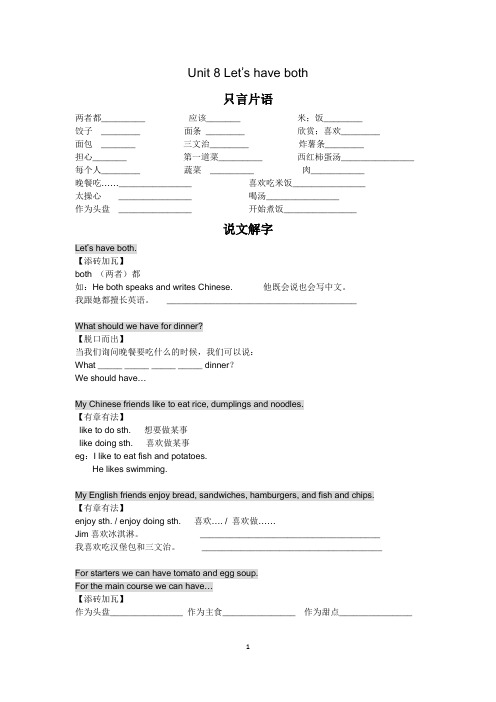
Unit 8 Let’s have both只言片语两者都_________ 应该_______ 米;饭________饺子________面条________ 欣赏;喜欢________面包_______ 三文治________炸薯条________担心_______ 第一道菜_________ 西红柿蛋汤_______________每个人________ 蔬菜_________ 肉___________晚餐吃……_______________ 喜欢吃米饭_______________太操心_______________ 喝汤_______________作为头盘_______________ 开始煮饭_______________说文解字Let’s have both.【添砖加瓦】both (两者)都如:He both speaks and writes Chinese. 他既会说也会写中文。
我跟她都擅长英语。
_______________________________________What should we have for dinner?【脱口而出】当我们询问晚餐要吃什么的时候,我们可以说:What _____ _____ _____ _____ dinner?We should have…My Chinese friends like to eat rice, dumplings and noodles.【有章有法】like to do sth. 想要做某事like doing sth. 喜欢做某事eg:I like to eat fish and potatoes.He likes swimming.My English friends enjoy bread, sandwiches, hamburgers, and fish and chips.【有章有法】enjoy sth. / enjoy doing sth. 喜欢…. / 喜欢做……Jim喜欢冰淇淋。
- 1、下载文档前请自行甄别文档内容的完整性,平台不提供额外的编辑、内容补充、找答案等附加服务。
- 2、"仅部分预览"的文档,不可在线预览部分如存在完整性等问题,可反馈申请退款(可完整预览的文档不适用该条件!)。
- 3、如文档侵犯您的权益,请联系客服反馈,我们会尽快为您处理(人工客服工作时间:9:00-18:30)。
五年级快乐英语翻译(译林出版社,配套苏教版的)
第八课
第六十五页
在公元四世纪,有一个国王叫圣尼古拉斯。
他经常帮助那些穷人,经常施舍他们财物。
圣尼古拉斯就是圣诞老人的原型。
今天,圣诞老人是人们想象中的一个人物形象。
不过,几乎所有的儿童都相信存在这个圣诞老人的存在。
他们的想象中,圣诞老人是一个个子很高的年老的老爷爷,飘着白胡须,穿着红外衣。
他会把圣诞礼物送到每个孩子们准备好的袜子里。
不过,到底谁是圣诞老人?难道真的会有一个人能够在一个夜晚从烟囱里穿过到每家每户去派发礼物?当然是不可能的,也是不存在的。
事实的真相是孩子们的父母把礼物放到了袜子里。
第六十七页
小露珠
这是一个美好的夜晚。
天空是漆黑的,只有几颗星星在眨着眼睛。
看,这儿有个面积不大的池塘。
在池塘边上的草地中,一颗小露珠正在一片草叶上晃动着,旋转着,一闪一闪的,非常动人。
好像正在荡秋千一般。
黑夜慢慢地离去,天色渐渐地亮了起来。
小露珠也越来越大。
这时,她地好朋友来了。
小露珠:早上好,青蛙先生!
青蛙:早上好!哦,你是这样的闪亮,就像一颗钻石!太漂亮了!
小露珠:谢谢你!青蛙先生,你能为我唱首歌么?
青蛙:好呀!这也是我非常期待的,很乐意为你唱歌。
青蛙的歌结束的时候,这儿来了一只蟋蟀。
小露珠:早上好,蟋蟀先生!
蟋蟀:早上好!哇,我亲爱的小露珠呀,你是多么的晶莹透亮呀!你简直就是一块水晶。
你真是降落人间的天使!
小露珠:太谢谢你了!蟋蟀先生,你是那么的擅长拉小提琴。
蟋蟀:谢谢夸奖!
小露珠:你愿意加入到我们中来么?这样我们就可以一起来开个音乐会了。
蟋蟀:好极了!来吧,大伙一起来吧!
这是多么精彩的音乐会呀!
这时又飞来了一只蝴蝶。
蝴蝶:小伙伴们,早上好呀!
青蛙、蟋蟀、小露珠:你好,亲爱的蝴蝶小姐!
蝴蝶:你们的演出在精彩了!我从来没听过这么精彩的音乐会。
小露珠:真的有这么好?那么一起来吧,咱们一起嗨起来吧!
蝴蝶:哦,亲爱的小露珠,你真漂亮,你饱满得像个梨,水灵灵的!
小露珠:谢谢夸奖!
他们又一起唱呀,跳呀,开心极了。
小露珠:我是如此地开心,如此激动。
蟋蟀:我也是的。
蝴蝶:不要停,让我们尽情地欢乐吧!
青蛙:哟,现在是我们的时光,尽情地欢乐吧!
过了一段时间,太阳慢慢地从山后升起。
在朝霞的映衬中,小露珠显得格外的精神,在她的装饰中,大地的植物也变得更漂亮了。
他们会都沉浸在快乐和高兴中,度过了一段难忘的时光。
蝴蝶:哇,这真是一个快乐的世界!为什么我们不继续下去呢?
小露珠:因为。
我亲爱的朋友,太阳照射着大地,阳光越来越强了,天气也变得越来越热了。
我能感受到热量的逼近。
我想,我应当离开了。
青蛙、蟋蟀、蝴蝶:哦,这多遗憾!
青蛙:小露珠,你能留下来陪我们么?
蟋蟀:是呀,不要走,不要离开我们!
蝴蝶:小露珠,我们求你啦,我们需要你,不要离开我们!
小露珠:不要伤心,不要难过,我的亲爱的朋友。
我明天还会回来的。
到那个时候,咱们再来欢聚。
